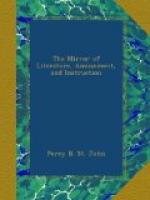“We reached Connaught Place without any accident, with the young savage as a trophy, and received the most affectionate welcome on our unexpected and safe return. Prayers were put up the following day at most of the fashionable churches, and a solemn te deum was composed expressly for the occasion. The young savage has already realized the expectation we formed of his docility and capacity; already he speaks our language equal to a native—has run through the whole of his property—keeps race-horses—and has an opera singer under his protection—never pays a bill, and is admitted without a voucher at every hell in the metropolis; has forgot his father’s name, and never hears the unknown region of ‘Russell Square’ mentioned, but he in-quires—’if that is not the place where the people drink porter, and don’t wear shoes and stockings?’”
* * * * *
SPIRIT OF THE PUBLIC JOURNALS.
* * * * *
THE DUST CART.
Dust, than which nothing can, upon a superficial view, be considered more insignificant, was, a few years back, of very considerable value, far surpassing the value of many things acquired by difficulty and danger, and for which the breadth of oceans are traversed, through storms and tempests. Perhaps a cruise to the Gold Coast, with all its drawbacks and contingencies, is scarcely so profitable as the returns on the quantity of dust collected in the City of London, during the time necessary for the voyage, and its accomplished return. About the period I allude to, the parish of St. Luke received no less a sum than between one and two thousand pounds a-year for dust collected, which, being placed to the parish account, tended in a great measure to keep down the poor’-rates. In addition to its value, no kind of property is better secured; as will be evinced, when the reader is informed that his present Majesty, George IV., when he was Prince Regent, lost an action for the recovery of the value of dust, carried away from the palace, by his servants, to be used as manure. In order to




